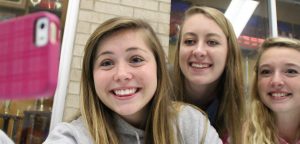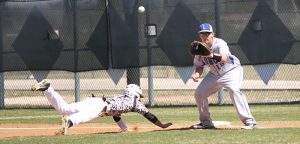By Moses Leos III
Like many athletes her age, 17-year-old Hays High softball player Aspen Salazar takes pride in her athletic abilities on the field.
But on March 19, the normally vivacious junior nearly had it all taken away.
What was thought to be a migraine headache that morning turned into a stroke — an event that pushed Salazar into the biggest battle of her young life.
“The doctors told me, ‘I don’t know if you will ever play softball again,’” Salazar said. “That’s when I started crying. It killed me inside a little bit. I didn’t’ want to hear that. That wasn’t the answer I wanted to hear.”
The stroke
Salazar’s day began to devolve during her first period class; she told teammate Lizzie Bowne about the dizziness she was experiencing.
Her symptoms soon worsened. Her dizziness got progressively worse, followed by double vision, and finally with a “killer headache.”
Many, including Salazar, attributed issues to not wearing her glasses. However, the eyewear didn’t rectify the problem.
She made her way to the nurse’s office where her mother picked her up from school.
“She could tell something was off,” Salazar said. “I was seeing three to four of the same thing.”
A nap suppressed some of the issues — enough to convince Salazar she could practice.
Fifteen minutes in, and the symptoms returned — dizziness, headache, double-vision, followed by nausea.
Those 15 minutes of practice are the last thing Salazar remembers from that practice.
Former Hays softball head coach Aaron Fuller was working with his infielders when the incident happened. He immediately gathered from his team and coaches that something was seriously wrong.
“The girls were telling me during outfield drills, she didn’t catch any balls … She was having a hard time standing up,” Fuller said. “Her face got droopy. She wasn’t acting right.”
“My teammates told me my eyes were looking different ways,” Salazar said. “My whole left side wasn’t working. I was using the corner of my mouth. I fell to the ground. I don’t remember any of this.”
Aftermath
The next thing Salazar recalls is waking up in a CAT-Scan. By that time, her mother, Heather Ruiz, had swiftly taken her to Seton Medical Center Hays.
Salazar got a rundown of what happened. However, doctors wouldn’t tell her what exactly was wrong.
After two more tests, she and her mom got the diagnosis: a stroke.
“I looked over at mom, and she started bawling. I had never seen her lose it like that,” Salazar said. “The doctor said, ‘I don’t know when you are going to be able to do anything.’”
Doctors said Salazar suffered a cryptogenic stroke, one which the cause of is officially unknown.
They believe a blood clot of unknown origin traveled through a hole in Salazar’s heart. It then lodged itself in the left medial thalamus in her brain, the portion that controls motor skills, vision and memory.
The diagnosis shook Salazar and her family. But it also fueled her desire to get back on the field.
“During therapy, I told myself I’m going to be back on the field,” Salazar said. “I’m not going to let this thing define who I am.”
The road to recovery was arduous. Salazar stayed in the hospital for three weeks; two were spent in physical therapy to regain her motor skills.
The process was draining, both emotionally and physically.
“I lost a lot of motor movement on my left side,” she said. “I couldn’t remember how to hit or how to throw. I had to relearn how to walk, I couldn’t remember.”
Recovery
It took three days after the incident for her left side to work again — three weeks before her vision was restored.
Helping Salazar were her teammates and coaches, who visited as often as they could.
“It was tremendous. They were there at the hospital every day,” she said. “I talked with the girls every night and always after practice. Their support was insane.”
Eventually, Salazar exited the hospital, and returned to class. She still yearned to get back on the diamond.
Fuller made sure she took one day at a time, whether it was helping her find her swing or rebuilding her arm strength.
“You have to have patience while she relearned how to do everything,” Fuller said. “That was something that myself and other coaches and the team understood.”
Salazar was cleared to dress out again on April 11 against Boerne Champion. She returned to the field on May 25, when Hays took on San Antonio Jefferson in the bi-district playoff round.
“It was amazing. That feeling of being out there, and having the chance to play. It was amazing,” Salazar said. “Getting there is what made it all worth while.”
Doctors told Salazar her event was uncommon. However, the stroke continues to affect her liveliness; her left medial thalamus no longer functions.
But seeing her recover from her experience was meaningful for Fuller and team.
“Every step she made was a big deal. Her getting out of hospital and to practice was a huge deal,” Fuller said. “Once she suited out, it was a big deal. It meant a lot.”
As she prepares for the 2015 season, Salazar sees the experience as a reminder to not take anything for granted.
“You have to play and do everything like it could get taken away. It could happen,” Salazar said. “It motivated me to do everything as hard and as best as I can. I don’t want to have that feeling ever again.”







